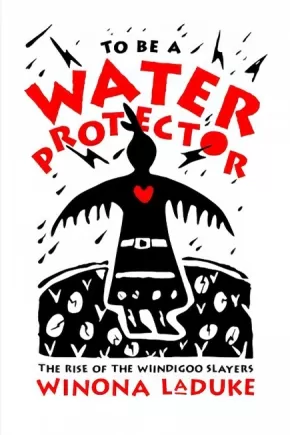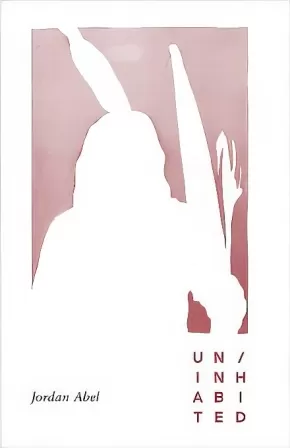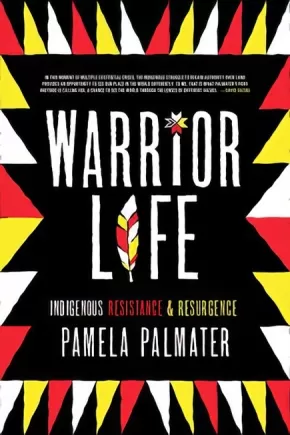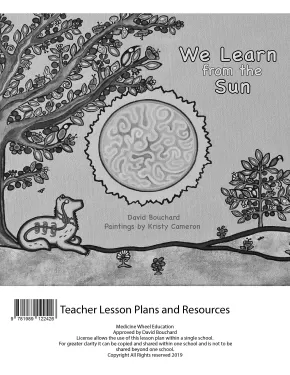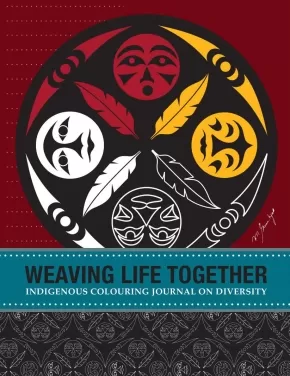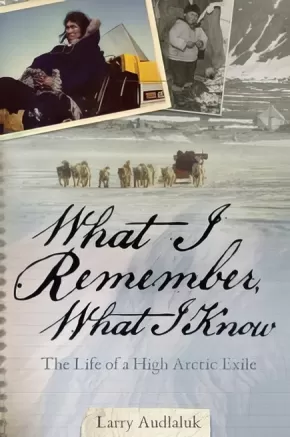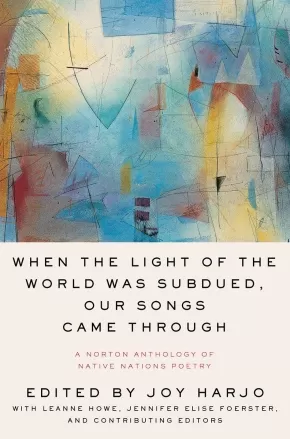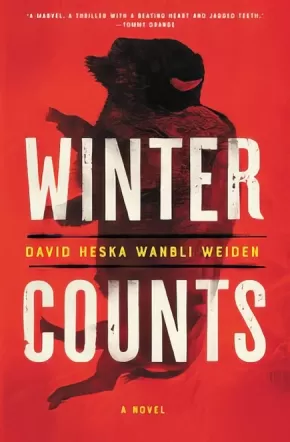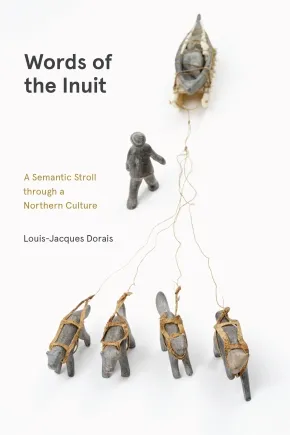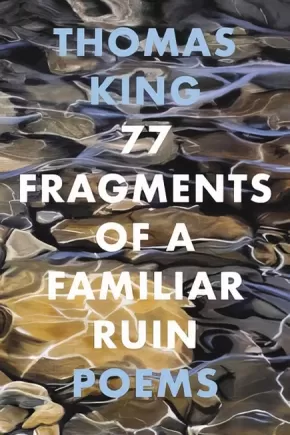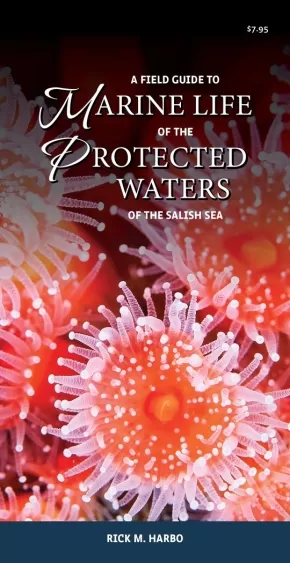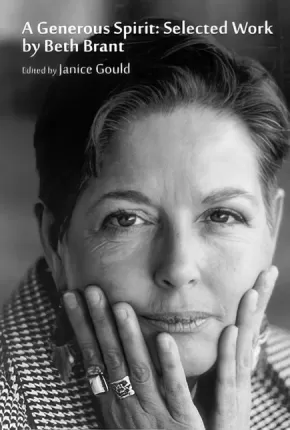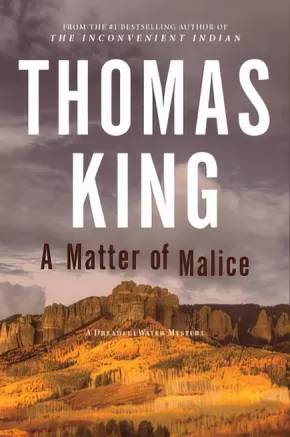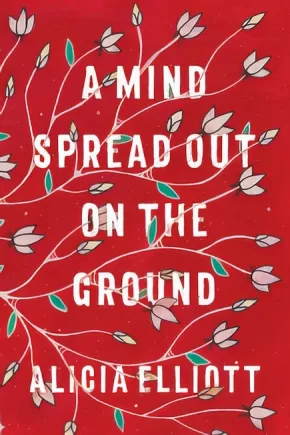
Adult Book
856
-
870
of
1380 Results;
Sort By
Go To
of 92
To Be A Water Protector: The Rise of the Wiindigoo Slayers
$27.00
Format:
Paperback
Text Content Territories:
Indigenous American; Indigenous Canadian;
Grade Levels: University/College;
ISBN / Barcode: 9781773632674
Synopsis:
Synopsis:
Winona LaDuke is a leader in cultural-based sustainable development strategies, renewable energy, sustainable food systems and Indigenous rights. To Be a Water Protector explores issues that have been central to her activism for many years — sacred Mother Earth, our despoiling of Earth and the activism at Standing Rock and opposing Line 3.
For this book, Winona discusses several elements of a New Green Economy and the lessons we can take from activists outside the US and Canada. Also featured are her annual letters to Al Monaco, the CEO of Enbridge, in which she takes him to task for the company’s role in the climate crisis and presents him with an invoice for climate damages. In her unique way of storytelling, Winona LaDuke is inspiring, always a teacher and an utterly fearless activist, writer and speaker.
Reviews
"Since time immemorial, Indigenous Peoples have protected the earth’s precious water systems in recognition of our dependence on these living ecosystems. Water Protectors are earth warriors who put their bodies on the line in the face of powerful, violent and destructive extractive industries supported by Wiindigoo governors. Winona LaDuke is one of those Water Protectors who has made a compelling call to all peoples to rise up and protect the water and in so doing protect life itself on this planet." — Pamela Palmater, Author of Warrior Life
Additional Information
128 pages | 6.00" x 9.00"
Un/inhabited - 2nd Edition
$24.95
Format:
Paperback
Text Content Territories:
Indigenous Canadian;
ISBN / Barcode: 9781772012682
Synopsis:
Synopsis:
This is the second edition of award-winning Nisga’a poet Jordan Abel’s second collection of poetry, Un/inhabited, which maps the terrain of the public domain to create a layered investigation of the interconnections between language and land.
Abel constructed the book’s source text by compiling ninety-one complete western novels found on Project Gutenberg, an online archive of public domain works. Using his word processor’s Ctrl+F function, he searched the document in its totality for words that relate to the political and social aspects of land, territory, and ownership. Each search query represents a study in context (How was this word deployed? What surrounded it? What is left over once that word is removed?) that accumulates toward a representation of the public domain as a discoverable and inhabitable body of land.
Featuring essays by Project Space founder Tracy Stefanucci and independent curator Kathleen Ritter – the first pieces of scholarship on Abel’s work – Un/inhabited reminds us of the power of language as material and invites us to reflect on what is present when we see nothing.
Additonal Information
240 pages | 5.40" x 8.50" | Paperback | 2nd Edition
Warrior Life: Indigenous Resistance and Resurgence
$25.00
Format:
Paperback
Text Content Territories:
Indigenous Canadian;
Grade Levels: University/College;
ISBN / Barcode: 9781773632902
Synopsis:
Synopsis:
In a moment where unlawful pipelines are built on Indigenous territories, the RCMP make illegal arrests of land defenders on unceded lands, and anti-Indigenous racism permeates on social media; the government lie that is reconciliation is exposed. Renowned lawyer, author, speaker and activist, Pamela Palmater returns to wade through media headlines and government propaganda and get to heart of key issues lost in the noise.
Warrior Life: Indigenous Resistance and Resurgence is the second collection of writings by Palmater. In keeping with her previous works, numerous op-eds, media commentaries, YouTube channel videos and podcasts, Palmater’s work is fiercely anti-colonial, anti-racist, and more crucial than ever before.
Palmater addresses a range of Indigenous issues — empty political promises, ongoing racism, sexualized genocide, government lawlessness, and the lie that is reconciliation — and makes the complex political and legal implications accessible to the public.
From one of the most important, inspiring and fearless voices in Indigenous rights, decolonization, Canadian politics, social justice, earth justice and beyond, Warrior Life is an unflinching critique of the colonial project that is Canada and a rallying cry for Indigenous peoples and allies alike to forge a path toward a decolonial future through resistance and resurgence.
Reviews
“In this moment of multiple existential crises from climate change to species extinction, ocean degradation, toxic pollution and so on, the Indigenous struggle to regain authority over land provides an opportunity to see our place in the world differently. To me, that is what Palmater’s fiery rhetoric is calling for, a chance to see the world through the lenses of different values.” — David Suzuki
“As governments try to pull the wool over the public eye by suggesting contemporary colonial acts are best for Indigenous peoples, Palmater helps us see the wrongdoing so we can become informed and be respectful change allies. Read this book to see the many faces of colonialism and to learn how truth, justice, and respect can defeat it.” — Cindy Blackstock, First Nations Child and Family Caring Society of Canada
Educator Information
Table of Contents
Foreword by Niigaanwewidam James Sinclair
Harper’s Gone, Now It’s Time to Look Within
The Worst Thing That Could Happen Is A First Nations Minister of Indian Affairs
Will We See Real Nation to Nation Respect With Trudeau?
Evidence of Good Faith Lacking in Trudeau’s Indigenous Agenda
Why Is Trudeau Government Opposing Charter Equality for Indigenous Women?
PM Trudeau’s Nation to Nation Relationship Disappeared with Empty Budget Promises
Trudeau’s Dance of Deception on Indigenous Rights
Trudeau’s Forked Tongue Reconciliation At UN
Indigenous Issues Disappear Slowly from Election 2019
Canada’s Ongoing Racial Discrimination Against Indigenous Women and Children Discussed at United Nations
Lethal Impact of Racism on Indigenous Health
Overincarceration Of Indigenous Peoples Nothing Short of Genocide
First Nations Water Crisis Problems A Crisis of Canada’s Own Making
Saskatchewan: The Land of The Living Skies and Lethal Racism
Justice for Our Stolen Children Camp
How Canada Turned A Blind Eye to The Suicide Crises In First Nations
Don’t Forget the Racist Canadians Behind the Racist Systems
The Ongoing Legacies of Canadian Genocide
Sexualized Genocide
Corporate Conquistadors Rape Indigenous Lands and Bodies
Bill S-3 Amendments to The Indian Act and the Never-Ending Battle for Equality for Indigenous Women
What You Need to Know About Sharon McIvor’s UN Victory on Indian Status
The People Left Behind by Trudeau’s Promised Nation to Nation Relationship (Co-Authored with Sharon McIvor)
Federal Budget 2019 Indigenous Women & Children Left Behind Again
Public Inquiry Needed to Address Sexualized Violence in Policing and Corrections
Why Canada Should Stand Trial for Tina Fontaine’s Murder
Justice System Still Not Protecting Indigenous Women and Girls
Missing and Murdered: Canada’s Genocide Cover-Up
Transitional Justice Plan Needed to End Genocide in Canada
Bill C-92’s Indigenous Child Welfare Act More Pan-Indigenous Legislation That Risks Continuing the Status Quo
Bill C-91 An Act Respecting Indigenous Languages: More Hollow Reconciliation
Canada’s Criminalization of The Indigenous Tobacco Trade
Cannabis Legalization Ignores First Nations
NAFTA 2.0 – Time to Get It Right or Kill It
Bill C-51, Anti-Terrorism Act, Testimony and Questions at Senate Committee on Public Safety and National Security
RCMP Invasion of Wet’suwet’en Nation Territory Breaches Canada’s Rule of Law
Killer Whales, Trans Mountain Pipeline and The Public Interest (Part 1)
It’s Up to Indigenous Environmental Groups to Protect the Public Interest (Part 2)
Clearing the lands has always been at the heart of Canada’s Indian Policy
The blockades no one talks about devastate Indigenous economies
The Liberals Plans for Indigenous Reconciliation are Just Beads and Trinkets
Abolishing the Indian Act Means Eliminating First Nations’ Rights
The Source of Our Power Has Always Been in Our Peoples – Not Voting in Federal Elections
Indigenous Rights are Not Conditional on Public Opinion
Reconciliation with Indigenous Peoples in Universities and Colleges
True Test of Reconciliation: Respect the Indigenous Right to Say No
The Indigenous Right to Say No
A Modern Treaty to Save Our Peoples and the Planet
Social Conflict Inevitable in Decolonization Battle
Indigenous Women Warriors are the Heart of Indigenous Resistance
Wet’suwet’en: a wake-up call for Canada
References
Index
Additional Information
272 pages | 6.00" x 9.00"
We Learn from the Sun: Lesson Plans and Resources
$7.99
Artists:
Format:
Paperback
Text Content Territories:
Indigenous Canadian; First Nations; Anishinaabeg;
ISBN / Barcode: 9781989122426
Synopsis:
Synopsis:
David Bouchard is a bestselling author, speaker and educator. He is Canada’s most sought after public speaker. We Learn from the Sun is an Indigenous rhyming poem based on his best selling book Seven Sacred Teachings.
This is a Teacher Lesson Plan and Resource Guild to accompany We Learn from the Sun, a richly illustrated book by Métis writer David Bouchard and Métis illustrator Kristy Cameron that weaves together Woodland style paintings with a rhythmic poem about the spiritual lessons that we can learn from the Sun and the seven sacred teachings.
Educator Information
This lesson plan and resource guide is approved by David Bouchard. License allows the use of this lesson plan within a single school.
The English lesson plans for We Learn From The Sun, includes:
– Fill in the Blanks Activity
– Word Search
– Colouring
– Write Your Own Poetry
– Matching Activity
Additional Information
15 pages | 8.50" x 11.00"
Weaving Life Together: Indigenous Colouring Journal on Diversity
$12.99
Artists:
Format:
Paperback
Text Content Territories:
Indigenous Canadian;
ISBN / Barcode: 9781554766253
Synopsis:
Synopsis:
Each page offers traditional and cultural insights into the natural and supernatural worlds. Thought-provoking questions are intended to deepen personal development and our relationships with others. The corresponding animal on the next page allows readers to take the time to further reflect and connect with their creativity as they colour in the animals.
Additional Information
32 Pages
What I Remember, What I Know
$25.95
Format:
Paperback
Text Content Territories:
Indigenous Canadian; Inuit;
ISBN / Barcode: 9781772272376
Synopsis:
Synopsis:
Larry Audlaluk has seen incredible changes in his lifetime. Born in northern Quebec, he relocated with his family to the High Arctic in the early 1950s. They were promised a land of plenty. They discovered an inhospitable polar desert.
Sharing memories both painful and joyous, Larry takes the reader on a journey to the Arctic as his family struggles to survive and new communities are formed. By turns heart-wrenching and humorous. Larry tells of his journey through relocation, illness, residential schooling, and the encroachment of southern culture.
Excerpt from What I Remember, What I Know
Many stories have been written about how Inuit families were relocated to the High Arctic. The one most written about is economic opportunity. The other is sovereignty. The writers are always careful to use the word "claims" when they're talking about sovereignty, as if to make our claims untrue. The story is long, complicated, and documented by various groups, besides the official records. It has been told from so many angles and moods, from social and political perspectives. I will tell you the story of my family's relocation from personal experience.
Additional Information
300 pages | 6.00" x 9.00"
When the Light of the World Was Subdued, Our Songs Came Through: A Norton Anthology of Native Nations Poetry
$25.95
Editors:
Format:
Paperback
Text Content Territories:
Indigenous American;
Grade Levels: 12; University/College;
ISBN / Barcode: 9780393356809
Synopsis:
Synopsis:
United States Poet Laureate Joy Harjo gathers the work of more than 160 poets, representing nearly 100 indigenous nations, into the first historically comprehensive Native poetry anthology.
This landmark anthology celebrates the indigenous peoples of North America, the first poets of this country, whose literary traditions stretch back centuries. Opening with a blessing from Pulitzer Prize–winner N. Scott Momaday, the book contains powerful introductions from contributing editors who represent the five geographically organized sections. Each section begins with a poem from traditional oral literatures and closes with emerging poets, ranging from Eleazar, a seventeenth-century Native student at Harvard, to Jake Skeets, a young Diné poet born in 1991, and including renowned writers such as Luci Tapahanso, Natalie Diaz, Layli Long Soldier, and Ray Young Bear. When the Light of the World Was Subdued, Our Songs Came Through offers the extraordinary sweep of Native literature, without which no study of American poetry is complete.
Reviews
This anthology is revelatory and stunning.… It shows the remarkable strength and diversity of Native poetry, which vitalizes all of American poetry. It is essential reading.—Arthur Sze, National Book Award–winning author of Sight Lines
Additional Information
352 pages | 6.14" x 9.29" | Paperback
Winter Counts: A Novel
$34.99
Format:
Hardcover
Text Content Territories:
Indigenous American; Native American; Sioux; Lakota; Sicangu Oyate (Rosebud Sioux Tribe);
Grade Levels: University/College;
ISBN / Barcode: 9780062968944
Synopsis:
Synopsis:
A groundbreaking thriller about a vigilante on a Native American reservation who embarks on a dangerous mission to track down the source of a heroin influx.
Virgil Wounded Horse is the local enforcer on the Rosebud Indian Reservation in South Dakota. When justice is denied by the American legal system or the tribal council, Virgil is hired to deliver his own punishment, the kind that’s hard to forget. But when heroin makes its way into the reservation and finds Virgil’s nephew, his vigilantism suddenly becomes personal. He enlists the help of his ex-girlfriend and sets out to learn where the drugs are coming from, and how to make them stop.
They follow a lead to Denver and find that drug cartels are rapidly expanding and forming new and terrifying alliances. And back on the reservation, a new tribal council initiative raises uncomfortable questions about money and power. As Virgil starts to link the pieces together, he must face his own demons and reclaim his Native identity. He realizes that being a Native American in the twenty-first century comes at an incredible cost.
Winter Counts is a tour-de-force of crime fiction, a bracingly honest look at a long-ignored part of American life, and a twisting, turning story that’s as deeply rendered as it is thrilling.
Reviews
“Winter Counts is a marvel. It’s a thriller with a beating heart and jagged teeth. This book is a brilliant meditation on power and violence, and a testament to just how much a crime novel can achieve. Weiden is a powerful new voice. I couldn’t put it down.” —Tommy Orange, author of There There
Additional Information
336 pages | 6.00" x 9.00"
Words of the Inuit: A Semantic Stroll through a Northern Culture
$31.95
Format:
Paperback
Text Content Territories:
Indigenous Canadian; Inuit;
Grade Levels: University/College;
ISBN / Barcode: 9780887558627
Synopsis:
Synopsis:
Words of the Inuit is an important compendium of Inuit culture illustrated through Inuit words. It brings the sum of the author’s decades of experience and engagement with Inuit and Inuktitut to bear on what he fashions as an amiable, leisurely stroll through words and meanings.
Inuit words are often more complex than English words and frequently contain small units of meaning that add up to convey a larger sensibility. Dorais’ lexical and semantic analyses and reconstructions are not overly technical, yet they reliably evince connections and underlying significations that allow for an in-depth reflection on the richness of Inuit linguistic and cultural heritage and identity. An appendix on the polysynthetic character of Inuit languages includes more detailed grammatical description of interest to more specialist readers.
Organized thematically, the book tours the histories and meanings of the words to illuminate numerous aspects of Inuit culture, including environment and the land; animals and subsistence activities; humans and spirits; family, kinship, and naming; the human body; and socializing with other people in the contemporary world. It concludes with a reflection on the usefulness for modern Inuit—especially youth and others looking to strengthen their cultural identity —to know about the underlying meanings embedded in their language and culture.
With recent reports alerting us to the declining use of the Inuit language in the North, Words of the Inuit is a timely contribution to understanding one of the world’s most resilient Indigenous languages.
Reviews
"Professor Dorais once again provides expert information and insight into the Inuit language and culture as only he can. This book is written so that academics, Inuit and the public can all learn more about the people who live in Canada’s most northern region. By examining the rich meanings contained within words of Inuktitut, Dorais details social nuances and core aspects of both traditional and modern Inuit culture.”— Alana Johns
Educator Information
Table of Contents
Introduction: Words from the Past, A Stroll Through Inuit Semantics
Ch. 1: Words for Speaking About the Environment and Land
Ch. 2: Words for Speaking About Animals and Subsistence Activities
Ch. 3: Words for Speaking About Humans and Animals
Ch. 4: Words for Speaking About Family, Kinship, and Naming
Ch. 5: Words for Speaking About the Human Body
Ch. 6: Words for Socializing in the Contemporary World
Conclusion: Words for the Future
Additional Information
344 pages | 6.00" x 9.00" | 2 maps, 2 figures, bibliography
77 Fragments of a Familiar Ruin
$19.99
Format:
Paperback
Text Content Territories:
Indigenous Canadian;
Grade Levels: University/College;
ISBN / Barcode: 9781443459440
Synopsis:
Synopsis:
Timely, important, mischievous, powerful: in a word, exceptional.
Seventy-seven poems intended as a eulogy for what we have squandered, a reprimand for all we have allowed, a suggestion for what might still be salvaged, a poetic quarrel with our intolerant and greedy selves, a reflection on mortality and longing, as well as a long-running conversation with the mythological currents that flow throughout North America.
Additional Information
96 pages | 6.00" x 9.00"
A Field Guide to Marine Life of the Protected Waters of the Salish Sea
$7.95
Format:
Pamphlet
Reading Level: N/A
ISBN / Barcode: 9781550178531
Synopsis:
Synopsis:
A Field Guide to Marine Life of the Protected Waters of the Salish Sea includes the most commonly observed species in the tide pools and protected waters of the Salish Sea—that intricate network of coastal waterways spanning southern BC and northwestern Washington. Covering invertebrates, fish and seaweeds, this guide includes key identification features, fun facts and habitat, as well as seventy colour photographs. Water-resistant and compact, this guide is easy to pack on any trip to the shore and perfect for curious minds of all ages.
Rick Harbo is one of the Pacific Northwest’s leading marine writers and photographers.
Additional Information
2 pages | 37.00" x 9.00" | 75 photographs | Pamphlet
A Generous Spirit: Selected Works by Beth Brant
$22.95
Editors:
Format:
Paperback
Text Content Territories:
Indigenous Canadian; First Nations; Haudenosaunee (Iroquois); Kanyen'keha:ka (Mohawk); Tyendinaga;
Grade Levels: University/College;
ISBN / Barcode: 9781771336857
Synopsis:
Synopsis:
A Generous Spirit: Selected Work by Beth Brant collects the writing of Beth Brant, Mohawk lesbian poet, essayist, and activist. During her life, Brant's work gave voice to an often unacknowledged Two-Spirit identity, and today, her words represent continued strength, growth, and connection in the face of deep suffering. A Generous Spirit is Brant's portrait of survival and empathy at the intersection of Native American and lesbian experience.
Edited by noted Native poet and scholar Janice Gould, A Generous Spirit recounts and enacts the continuance of her people and her sisters with distinct, organic voices and Brant's characteristic warmth. Her work is a simultaneous cry of grief and celebration of human compassion and connection in its shared experience. Through storytelling, her characters wrest their own voices from years of silence and find communion with other souls.
Additional Information
200 pages | 5.37" x 8.50"
A Matter of Malice
$22.99
Format:
Paperback
Text Content Territories:
Indigenous American; Native American; Cherokee;
Grade Levels: 12; University/College;
ISBN / Barcode: 9781443455176
Synopsis:
Synopsis:
When a TV producer asks Thumps to assist with an episode about a local woman from a wealthy family whose death was ruled “misadventure,” he is reluctant to get involved. Then the producer dies in the exact same manner, and Thumps finds himself solving two cases.
Can a reality TV show solve a cold case?
The crew of a true-crime reality TV show, Malice Aforethought, shows up in Chinook to do an episode about the death of Trudy Samuels. Trudy’s death had originally been ruled accidental, but with ratings in mind, one of the producers, Nina Maslow, wants to prove it was murder. And she wants Thumps to help. Thumps is reluctant to get involved until Nina dies in the exact same place and in the exact same way as Trudy. Are the two deaths related? Or are there two murderers on the loose in Chinook? Thumps uses Nina’s Malice Aforethought files to try to fit the pieces of the puzzle together, and in the process discovers that she had already started work on another case close to Thumps' heart: the Obsidian murders.
Series Information
This novel is part of the DreadfulWater Mystery series from Thomas King. Books in this series include:
- Dreadful Water
- The Red Power Murders
- Cold Skies
- A Matter of Malice
- The Obsidian Murders
- Deep House
- Double Eagle
- Black Ice
Additional Information
|
A Mind Spread Out on the Ground
$21.00
Format:
Paperback
Text Content Territories:
Indigenous Canadian; First Nations; Haudenosaunee (Iroquois);
Grade Levels: 12; University/College;
ISBN / Barcode: 9780385692403
Synopsis:
Synopsis:
A bold and profound work by Haudenosaunee writer Alicia Elliott, A Mind Spread Out on the Ground is a personal and critical meditation on trauma, legacy, oppression and racism in North America.
In an urgent and visceral work that asks essential questions about the treatment of Native people in North America while drawing on intimate details of her own life and experience with intergenerational trauma, Alicia Elliott offers indispensable insight and understanding to the ongoing legacy of colonialism. What are the links between depression, colonialism and loss of language--both figurative and literal? How does white privilege operate in different contexts? How do we navigate the painful contours of mental illness in loved ones without turning them into their sickness? How does colonialism operate on the level of literary criticism?
A Mind Spread Out on the Ground is Alicia Elliott's attempt to answer these questions and more. In the process, she engages with such wide-ranging topics as race, parenthood, love, mental illness, poverty, sexual assault, gentrification, writing and representation. Elliott makes connections both large and small between the past and present, the personal and political--from overcoming a years-long history with head lice to the way Native writers are treated within the Canadian literary industry; her unplanned teenage pregnancy to the history of dark matter and how it relates to racism in the court system; her childhood diet of Kraft dinner to how systematic oppression is linked to depression in Native communities. With deep consideration and searing prose, Elliott extends far beyond her own experiences to provide a candid look at our past, an illuminating portrait of our present and a powerful tool for a better future.
Reviews
"This book is hard, vital medicine. It is a dance of survival and cultural resurgence. Above all, it is breathtakingly contemporary Indigenous philosophy, in which the street is also part of the land, and the very act of thinking is conditioned by struggles for justice and well-being." —Warren Cariou, author of Lake of the Prairies
"These essays are of fiercest intelligence and courageous revelation. Here, colonialism and poverty are not only social urgencies, but violence felt and fought in the raw of the everyday, in embodied life and intimate relations. This is a stunning, vital triumph of writing." —David Chariandy, author of Brother
"Wildly brave and wholly original, Alicia Elliot is the voice that rouses us from the mundane, speaks political poetry and brings us to the ceremony of everyday survival. Her words remind us to carry both our weapons and our medicines, to hold both our strength and our open, weeping hearts. A Mind Spread Out on the Ground is what happens when you come in a good way to offer prayer, and instead, end up telling the entire damn truth of it all." —Cherie Dimaline, author of The Marrow Thieves
"A Mind Spread Out on the Ground is a new lens on Indigenous Canadian literature." —Terese Marie Mailhot, author of Heart Berries
"We need to clone Alicia Elliott because the world needs more of this badass writer. A Mind Spread Out on the Ground showcases her peculiar alchemy, lighting the darkest corners of racism, classism, sexism with her laser-focused intellect and kind-hearted soul-searching. A fresh and revolutionary cultural critic alternately witty, vulnerable and piercing." —Eden Robinson, author of Son of a Trickster and Trickster Drift
"The future of CanLit is female, is Indigenous—is Alicia Elliott. I anticipate this book to be featured on every 'best of' and award list in 2019, and revered for years to come." —Vivek Shraya, author of I’m Afraid of Men and even this page is white
"In A Mind Spread Out on the Ground, Elliott invites readers into her unceded mind and heart, taking us on a beautiful, incisive and punk rock tour of Tuscarora brilliance. Elliott's voice is fire with warmth, light, rage and endless transformation." —Leanne Betasamosake Simpson, author of This Accident of Being Lost
"Alicia Elliott has gifted us with an Indigenous woman's coming of age story, told through engagingly thoughtful, painfully poignant and enraging essays on race, love and belonging. With poetic prose and searing honesty, she lays bare what it is like to grow up Indigenous and exist in a country proud of its tolerance, but one that has proven to be anything but. She opens eyes and captures hearts, leading you by the hand to see our fractured world through her eyes. Alicia is exactly the voice we need to hear now." —Tanya Talaga, author of Seven Fallen Feathers
"Incisive. That's the word I keep coming back to. A Mind Spread out on the Ground is incredibly incisive. Alicia Elliot slices through the sometimes complicated, often avoided issues affecting so many of us in this place now called Canada. She is at once political, personal, smart, funny, global and, best of all, divinely human. Necessary. That's the other word I keep thinking about. In every chapter, she manages to find the perfect word and the precise argument needed—I found myself saying 'yes, yes, that is exactly it' more than once. I am so grateful for her work." —Katherena Vermette, author of The Break
"A Mind Spread Out on the Ground is an astonishing book of insightful and affecting essays that will stay with you long after the final page." —Zoe Whittall, author of The Best Kind of People
Additional Information
240 pages | 5.75" x 8.50"
A Reconciliation without Recollection?: An Investigation of the Foundations of Aboriginal Law in Canada
$57.00
Format:
Paperback
Text Content Territories:
Indigenous Canadian;
ISBN / Barcode: 9781487521875
Synopsis:
Synopsis:
The current framework for reconciliation between Indigenous peoples and the Canadian state is based on the Supreme Court of Canada’s acceptance of the Crown’s assertion of sovereignty, legislative power, and underlying title. The basis of this assertion is a long-standing interpretation of Section 91(24) of Canada’s Constitution, which reads it as a plenary grant of power over Indigenous communities and their lands, leading the courts to simply bypass the question of the inherent right of self-government.
In A Reconciliation without Recollection, Joshua Ben David Nichols argues that if we are to find a meaningful path toward reconciliation, we will need to address the history of sovereignty without assuming its foundations. Exposing the limitations of the current model, Nichols carefully examines the lines of descent and association that underlie the legal conceptualization of the Aboriginal right to govern.
Blending legal analysis with insights drawn from political theory and philosophy, A Reconciliation without Recollection is an ambitious and timely intervention into one of the most pressing concerns in Canada.
Educator Information
This work would be useful for the following subjects or courses: History, Canadian History, Indigenous Studies, Indigenous Politics, Indigenous Law, Law and Society, Philosophy, Political Science.
Includes forwards by John Borrows (Professor and Canada Research Chair in Indigenous Law at the University of Victoria Law School) and James Tully (emeritus distinguished professor of Political Science, Law, Indigenous Governance, and Philosophy at the University of Victoria).
Table of Contents
Part 1 Reconciliation without Recollection
1.1 Reconciliation in Canadian Jurisprudence
1.2 Reconciliation as Picture Thinking
A) Historicism
B) The Ship of State
1.3 History, Law and Legitimacy
1.4 Problem of Reconciliation as Problem of Foundations
1.5 A Genealogy of the Indian Act
Part 2 A Genealogy of Reconciliation: Civilizing, Extinction and Culturalism as the Discursive Foundations of the Indian Act
2.1 Liberty and Legitimate Despotism: The Liberal-Imperialism of J. S. Mill
2.2 The Science of Savage Character: The Uncivilized and Mill’s Philosophy of History
A) Governing the Uncivilized: The Role of the Intermediate Body
B) Peace, Order and Good Government: Mill and the Indian Question
2.3 Reading the Right of History: Universal History and the Extinction Thesis
2.4 From Enfranchisement to Reconciliation: Culturalism and Indirect Rule
Part 3 A Despotism for Dealing with Barbarians: A Survey of the Foundations of Indian Policy in Canada
3.1 Pre-Confederation to the Indian Act of 1876
A) Imperial Federalism
B) Imperial Civilizing
C) Assimilation and Indirect Rule
D) Striation or Continuity?
3.2 The Indian Question and the Dominion
3.3 The Six Nations Status Case
A) The Six Nations of the Grand River
B) The League of Nations and the Mandate System
C) The Documents
3.4 A Building Crisis of Legitimacy
Part 4 A Law Without Measure for a Land Without Citizens: The Indian Act in Canadian Jurisprudence
4.1 The Authority of s. 91(24)
A) St. Catherine’s Milling, s. 91(24) and the Division of Powers
B) Interjurisdictional Immunity and s. 91(24)
C) The Theory of Enclaves
D) The Uncertain Measure of Indianness
E) Section 88 and Provincial Law
4.2 The Definition of Indians and the Authority of Bands
A) Legislative Origins
B) The Judicial Definition of Indians
C) The Judicial Definition of Bands
D) Custom Band Councils and the Question of Jurisdiction
4.3 Tsilhqot'in Nation and the Meaning of s. 91(24)
Part 5 An Era of Reconciliation, An Era of Indirect Rule: From the White Paper to the Full Box of Rights
5.1 The Hidden Player: Policy from Calder to the Indian Act, 1985
A) Line One: Legislative Renovation
B) Line Two: Land Claim Agreements
C) Line Three: Constitutional Change
D) The Penner Report
E) The Problem of Implementing the New Relationship
F) The Era of Indirect Rule and the Mechanism of Deferral
5.2 Reconciliation and Implementation
A) Unsettling the Ship of State
B) Recollection without Historicism
C) Implementing Reconciliation-with-Recollection
Bibliography
Additional Information
408 pages | 6.00" x 9.00"
Sort By
Go To
of 92

